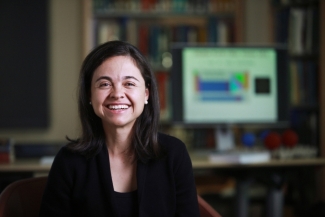Rey
My research interests are in the scientific interface between atomic, molecular and optical physics, condensed matter physics and quantum information science. Specifically, on ways of developing new techniques for controlling quantum systems and then using them in various applications ranging from quantum simulations/information to time and frequency standards. My group wants to engineer fully controllable quantum systems capable to mimic desired real materials as well as to develop advanced and novel measurement techniques capable of probing atomic quantum systems at the fundamental level.
Education
University of Maryland
College Park, Maryland, USA
Ph.D., Physics
August 2004
Dissertation Title: "Ultracold bosonic atoms in optical lattices"
Advisors: Charles W. Clark and Theodore R. Kirkpatrick
Universidad de los Andes
Bogota, Colombia
B.S., Physics
March 1999
Dissertation Title: "Propagation of electromagnetic radiation in Kerr's metric"
Advisors: Rafael Bautista
Academic Experience
Fellow of JILA
January 2012–Present
Associate Fellow of JILA
August 2008–January 2012
Adjoint Professor, Department of Physics, University of Colorado Boulder
September 2017–Present
Associate Research Professor
January 2013–August 2017
Assistant Research Professor
August 2008–January 2013
Institute of Theoretical Atomic, Molecular and Optical Physics (ITAMP)
At the Harvard-Smithsonian Center for Astrophysics, Cambridge, Massachusetts, USA.
Postdoctoral fellow
September, 2005 - 2008
National Institute of Standards and Technology (NIST)
Gaithersburg, Maryland, USA.
Postdoctoral researcher
September 2004 - September 2005
University of Maryland
College Park, Maryland, USA.
Research Assistant
September 2000 - September 2004



 The Physics Frontiers Centers (PFC) program supports university-based centers and institutes where the collective efforts of a larger group of individuals can enable transformational advances in the most promising research areas. The program is designed to foster major breakthroughs at the intellectual frontiers of physics by providing needed resources such as combinations of talents, skills, disciplines, and/or specialized infrastructure, not usually available to individual investigators or small groups, in an environment in which the collective efforts of the larger group can be shown to be seminal to promoting significant progress in the science and the education of students. PFCs also include creative, substantive activities aimed at enhancing education, broadening participation of traditionally underrepresented groups, and outreach to the scientific community and general public.
The Physics Frontiers Centers (PFC) program supports university-based centers and institutes where the collective efforts of a larger group of individuals can enable transformational advances in the most promising research areas. The program is designed to foster major breakthroughs at the intellectual frontiers of physics by providing needed resources such as combinations of talents, skills, disciplines, and/or specialized infrastructure, not usually available to individual investigators or small groups, in an environment in which the collective efforts of the larger group can be shown to be seminal to promoting significant progress in the science and the education of students. PFCs also include creative, substantive activities aimed at enhancing education, broadening participation of traditionally underrepresented groups, and outreach to the scientific community and general public.